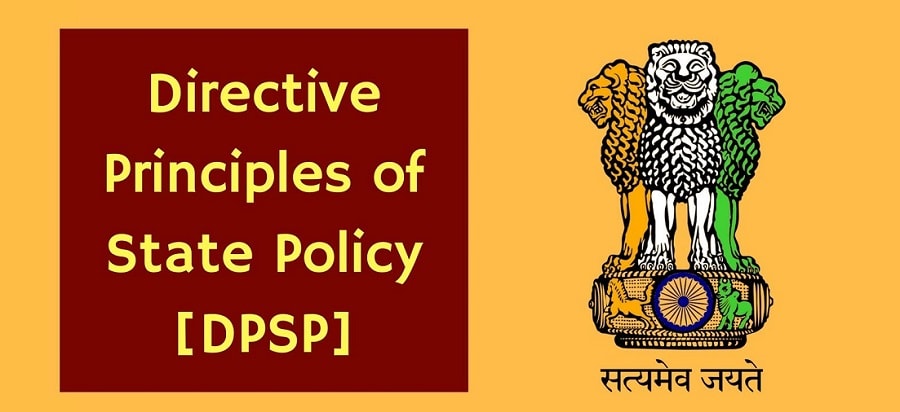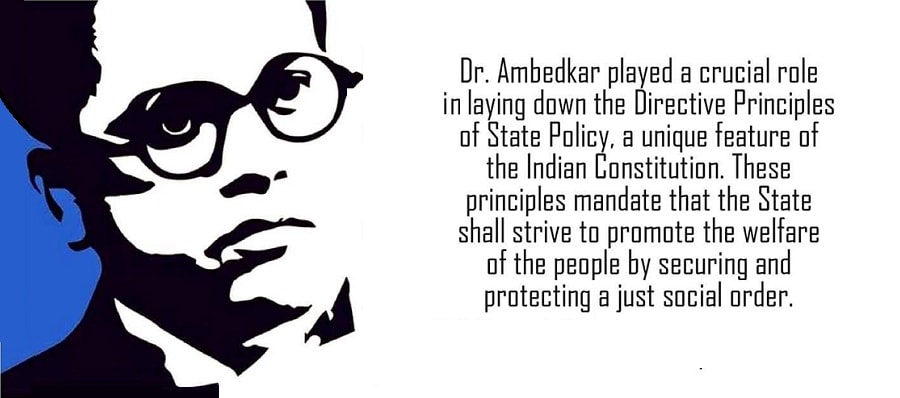Contents
>>>>>
- Articles 36 to 51, Part IV
- Directive principles of state policy was borrowed from the Irish Constitution of 1937.
- Irish Constitution had copied it from the Spanish Constitution.
- Dr. B R Ambedkar described DPSP as ‘novel features’ of the Indian Constitution.
- The DPSP with the FRs contain the philosophy and soul of the Constitution.
- Granville Austin has described the DPSP and the FRs as the ‘Conscience of the Constitution’.
>>>>>>

>>>>>>
Features of Directive Principles of State Policy
- According to Article 37, ‘Directive Principles of State Policy’ denotes the guidelines for the State to formulate policies and laws.
- DPSPs are the constitutional instructions to the State in the matters of
- Legislative
- Executive
- Administrative
- According to Article 36, the term ‘State’ in Part IV has the same meaning as in Part III, Fundamental Rights.
- The term ‘State’ includes
- Legislative and executive organs of the central and state governments
- All local authorities
- Public authorities in the country
- The DPSP followed the idea of the ‘Instrument of Instructions’ of the Government of India Act of 1935.
- The DPSPs constitute a very comprehensive economic, social and political program for a modern democratic State.
- Directive Principles of State Policy embody the concept of a ‘welfare state’ and not that of a ‘police state’.
- DPSP seeks to establish economic and social democracy in the country.
- Sir B N Rau, the Constitutional Adviser to the Constituent Assembly, recommended that the rights of an individual should be divided into two categories justiciable and non-justiciable.
- It was accepted by the Drafting Committee.
- The Directive Principles of State Policy are non-justiciable in nature.
- But Court can use DPSPs to examine the constitutional validity of a law.
Classification of DPSPs
- The Constitution does not contain any classification of Directive Principles.
- Basis of their content and direction, they can be classified into 3 broad categories
- Socialistic Principles
- Gandhian Principles
- Liberal–intellectual Principles
Socialistic Principles
- These types of Directive Principles of State Policy reflect the ideology of socialism.
- They aim at providing social and economic justice and set the path toward a welfare state.
- Article 38 promotes the welfare of the people by
- Securing a social order by justice – social, economic, and political
- Minimizing inequalities in income, status, facilities, and opportunities
- Article 39 secure
- Adequate means of livelihood for all citizens
- Equitable distribution of resources for the common good
- Prevention of concentration of wealth and means of production
- Equal pay for equal work
- Preservation of the health and strength of workers and children against forcible abuse
- Opportunities for the healthy development of children
- Article 39A promotes equal justice and free legal aid.
- It was inserted by the 42 Amendment Act, 1976.
- Article 41 secure
- Right to work
- Right to education
- Public assistance in cases of
- Unemployment
- Old age
- Sickness
- Disablement
- Article 42 provides just and humane conditions of work and maternity relief.
- Article 43 secures a living wage, a decent standard of living, and social and cultural opportunities for all workers.
- Article 43A secures the participation of workers in the management of industries.
- Article 47 raises the level of nutrition, the standard of living, and the health condition of people.
Gandhian Principles
- These types of Directive Principles of State Policy are based on Gandhian ideology.
- To fulfill the dreams of Gandhi, some of his ideas were included as Directive Principles.
- Article 40 directs to organize village panchayats and enables them to work as self-government.
- Article 43 promotes cottage industries on an individual or co-operation basis in rural areas.
- Article 43B promote voluntary formation, autonomous functioning, democratic control, and professional management of co-operative societies.
- Article 46 directs for the educational and economic interests of SCs, STs, and other weaker sections.
- Article 47 promotes prohibits the consumption of intoxicating drinks and drugs which are injurious to health.
- Article 48 directs to prohibit the slaughter of cows, calves, and other milch and draught cattle and to improve their breeds.
Liberal–Intellectual Principles
- These principles represent the ideology of liberalism.
- Article 44 directs to secure for all citizens a uniform civil code throughout the country.
- Article 45 promotes providing early childhood care and education for all until the age of 6 years.
- Article 48 promotes agriculture and animal husbandry on modern and scientific lines.
- Article 48A directs to protect and improve the environment and safeguard forests and wildlife.
- Article 49 promotes to the protection of monuments, places, and objects of national importance.
- Article 50 directs to separate the judiciary from the executive in the public services of the State.
- Article 51 promotes international peace, security, good relations, and respect for international law and treaties.
>>>>>>>

>>>>>>>
New Directive Principles
- 42nd Amendment Act of 1976 added four new Directive Principles to the original list.
- Article 39 to secure opportunities for the healthy development of children.
- Article 39A promotes equal justice and provides free legal aid to the poor.
- Article 43A protects the participation of workers in the management of Industries.
- Article 48A protects and improves the environment and to safeguard forests and wildlife.
- 44th Amendment Act added one more Directive Principle in Article 38
- The state should minimize inequalities in income, status, facilities, and opportunities.
- 86th Amendment Act of 2002 changed the subject matter of Article 45
- The State to provide early childhood care and education for all children until they complete the age of 6 years.
- 97th Amendment Act of 2011 added a new Directive Principle Article 43B, relating to co-operative societies.
Criticism of the Directive Principles
- No Legal Force is applicable to DPSP
- Illogically Arranged
- Conservative
- According to Sir Ivor Jennings, the Directives are based on the political philosophy of 19th century England.
- Constitutional Conflict
- Prime Minister gets a bill passed by the Parliament, the president may reject the bill on the ground that, it violates the Directive Principles.
- The ministry has no right to ignore them.
- The same constitutional conflict may occur between the governor and the chief minister at the state level.
- According to K T Shah DPSPs are ‘pious superfluities’
- K T Shah compared DPSP with ‘a cheque on a bank, payable only when the resources of the bank permit’.
- Nasiruddin said these principles are ‘no better than the new year’s resolutions, which are broken on the second of January’.
- T T Krishnamachari described DPSP as ‘a veritable dustbin of sentiments’.
- K C Wheare called them a ‘manifesto of aims and aspirations’ and opined that they serve as mere ‘moral homily’.
- Sir Ivor Jennings thought they are only as ‘pious aspirations’.
Utility of Directive Principles
- Stability and continuity in policies
- DPSPs facilitate stability and continuity in domestic and foreign policies in political, economic, and social spheres
- Changes in the party in power will not affect those policies.
- Supplementary to Fundamental Rights
- They are intended to fill in the vacuum in Part III by providing for social and economic rights.
- Their implementation creates a favorable atmosphere for the full enjoyment of the fundamental rights
- Because political democracy, without economic democracy, has no meaning.
- Enable opposition to exercise control over Parliament
- Directive Principles enable the opposition to exercise control over the operations of the government.
- The Opposition can blame the ruling party on the ground that its activities are opposed to the Directives.
- They serve as a crucial test for the performance of the government.
- Directive Principles are a common political manifesto for all parties in legislative and executive acts.
- People can examine the policies and programs of the government through DPSP.
Conflict between Fundamental Rights and Directive Principles
- Champakam Dorairajan case (1951)
- Supreme Court ruled that in case of any conflict between the FR and the DPSP, the former would prevail.
- It declared that the Directive Principles have to conform to and run as subsidiary to the Fundamental Rights
- Parliament reacted to the Supreme Court’s judgment in the Golaknath Case (1967) by enacting the 24th (1971) and the 25th Amendment Act (1971).
- 24th Amendment Act declared that the Parliament has the power to take away any of the Fundamental Rights.
- In the Kesavananda Bharati case (1973), the Supreme Court declared
- Judicial review is a basic feature of the Constitution
- 24th Amendment Act, 2nd provision of Article 31C as unconstitutional and invalid
- However, the above 1st provision of Article 31C was held to be constitutional and valid.
Difference between Fundamental Rights & DPSP
| Fundamental Rights | Directive Principles |
|---|---|
| These are negative as they prohibit the State from doing certain things. | DPSPs are positive as they require the State to do certain things |
| FRs are justiciable, that is, they are legally enforceable by the courts in case of their violation. | These are non-justiciable, that is, they are not legally enforceable by the courts for their violation. |
| They aim at establishing political democracy in the country. | DPSPs aim at establishing social and economic democracy in the country. |
| These have legal sanctions. | These have moral and political sanctions. |
| FRs promote the welfare of the individual. Hence, they are personal and individualistic. | DPSPs promote the welfare of the community. Hence, they are socialistic. |
| They do not require any legislation for their implementation. They are automatically enforced. | They require legislation for their implementation. They are not automatically enforced. |
| The courts are bound to declare a law violates any of the Fundamental Rights as unconstitutional and invalid. | The courts cannot declare a law violates of the DPSPs as unconstitutional. However, they can uphold the validity of a law on the ground that it was enacted to give effect to a directive. |
>>>>>>>
Directives outside Part IV
- Claims of SCs and STs to Services – Article 335 in Part XVI.
- Instruction in the mother tongue – Article 350-A in Part XVII.
- Development of the Hindi Language – Article 351 in Part XVII.




